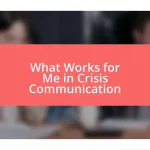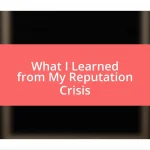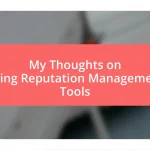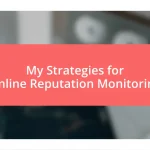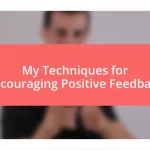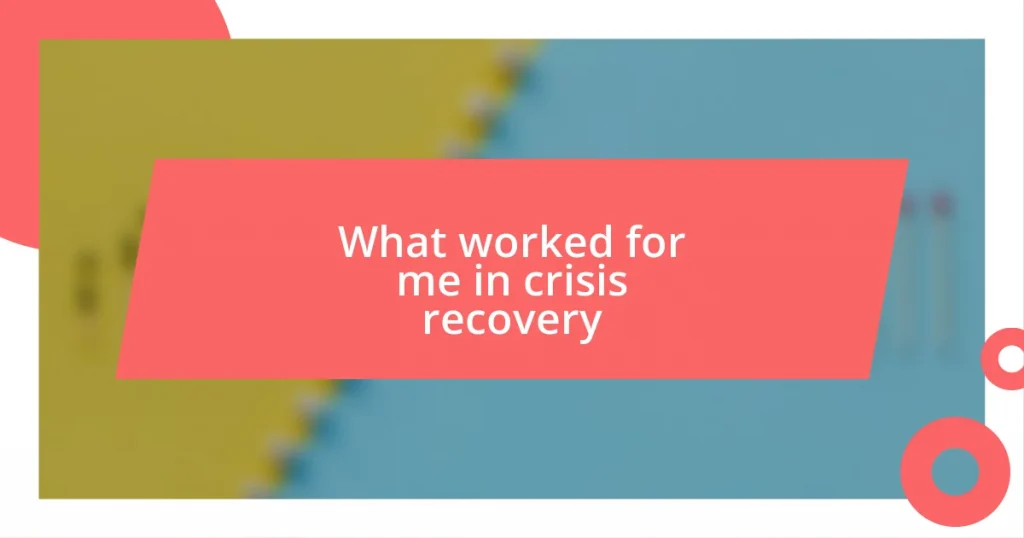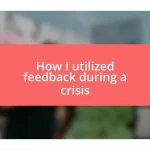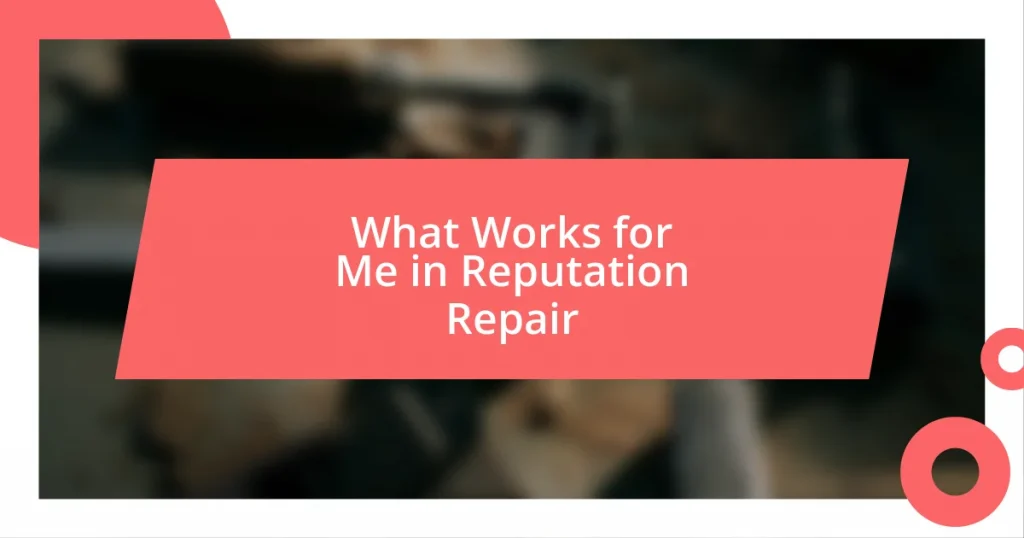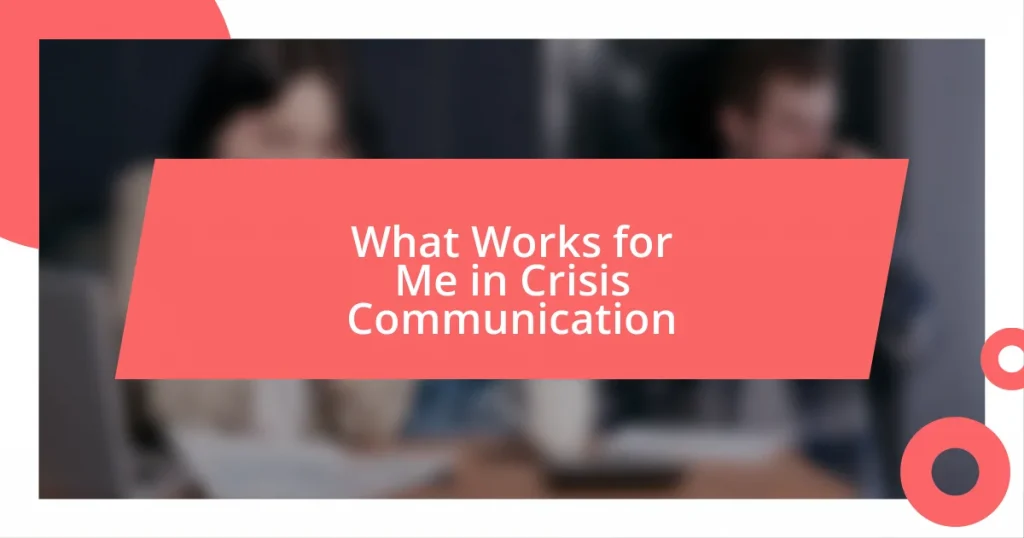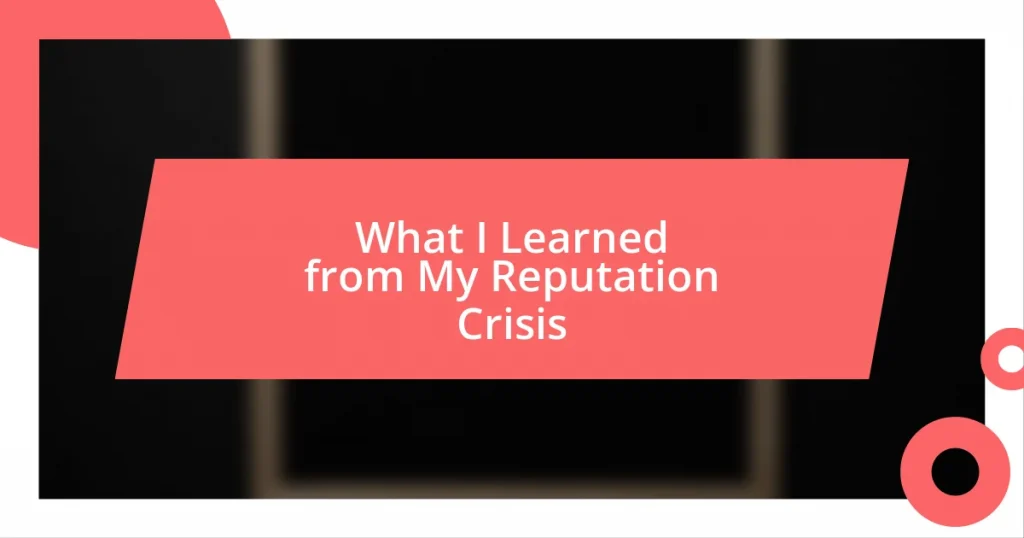Key takeaways:
- Embracing vulnerability and establishing a support network fosters emotional healing and a sense of belonging during crises.
- Practicing mindfulness, journaling, and engaging in creative expression are effective tools for processing emotions and enhancing resilience.
- Celebrating small wins and maintaining a gratitude practice cultivate a positive mindset and pave the way for future growth.
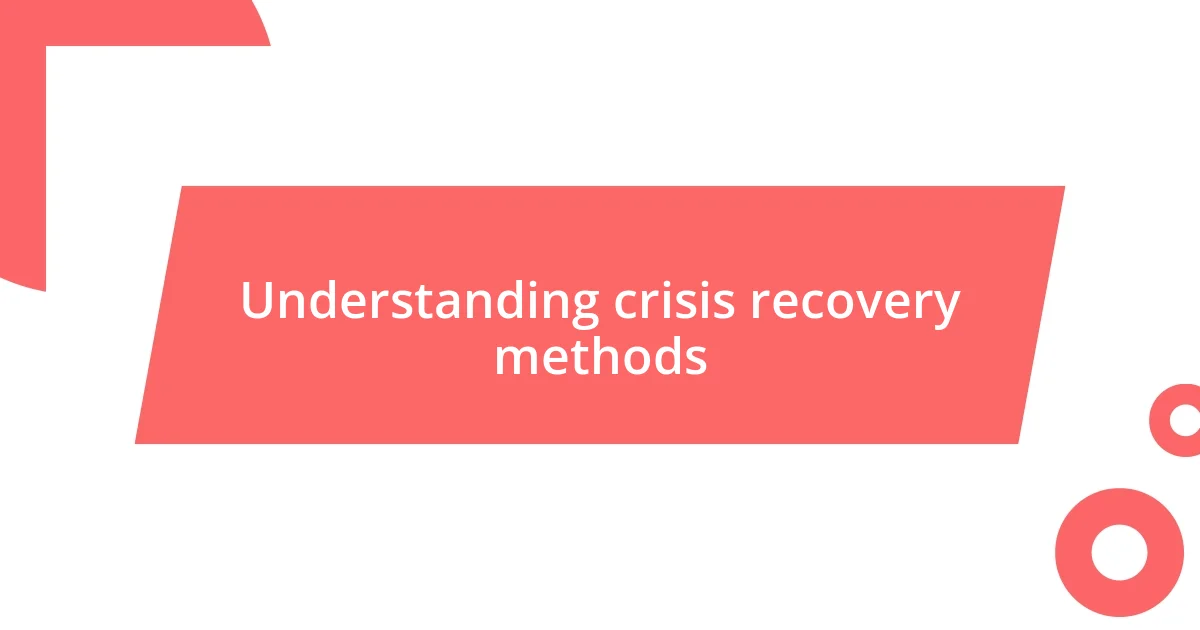
Understanding crisis recovery methods
Crisis recovery methods can be incredibly diverse, shaped by individual experiences and circumstances. I remember a particularly tough time when I relied heavily on a support network of friends and family—they provided a safety net that helped me regain my footing. It’s interesting to consider how different resources can be tailored to our unique situations; have you ever found that one kind word from a friend made all the difference?
One effective method I’ve discovered is the practice of mindfulness. During a challenging period in my life, taking just a few minutes each day to center myself through meditation helped clear my mind and reduce anxiety. I often wonder how many people overlook the simple but profound impact that self-reflection can have—isn’t it remarkable how a quiet moment can empower us to face even the darkest days?
Then there are tangible action steps, such as setting small, achievable goals. After my own setbacks, I started with tiny daily tasks that felt manageable, which gradually built my confidence. It’s fascinating how small victories can snowball into a more significant sense of achievement. Have you tried breaking tasks down like that? It can be a game changer in your recovery journey.
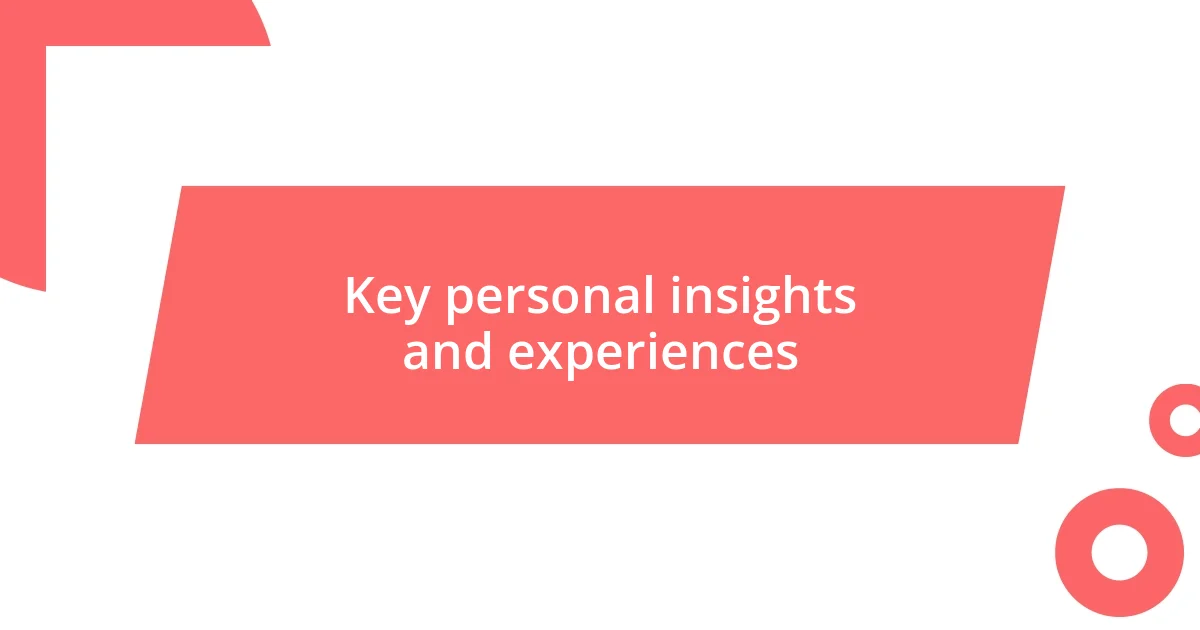
Key personal insights and experiences
I’ve learned that embracing vulnerability during tough times can be a catalyst for emotional healing. I once shared my struggles in a community support group, and surprisingly, it felt liberating to express my feelings openly. The warmth and validation from others in similar situations provided a unique comfort that helped me realize I wasn’t alone in my experiences. Have you ever shared your vulnerabilities with someone? It can lead to incredibly deep connections.
Finding purpose in the chaos has also been instrumental for me. After facing significant challenges, I channeled my energy into volunteering, which provided me not just with distraction, but a sense of fulfillment. Helping others during their crises reminded me of the resilience we all possess. It’s amazing how contributing to someone else’s journey can enhance your own healing. Have you thought about how helping others might aid your recovery process?
Lastly, journaling has become a crucial element of my recovery strategy. I initially approached it with skepticism, thinking it too simplistic. However, writing down my thoughts revealed patterns in my emotions that I hadn’t noticed before. This practice helped me process experiences, making them seem more manageable. How often do we overlook the power of putting pen to paper? It’s genuinely transformative.
| Experience | Insights |
|---|---|
| Vulnerability | Leads to emotional healing and deeper connections |
| Purpose through volunteering | Fosters resilience and fulfillment |
| Journaling | Helps process emotions and reveals patterns |
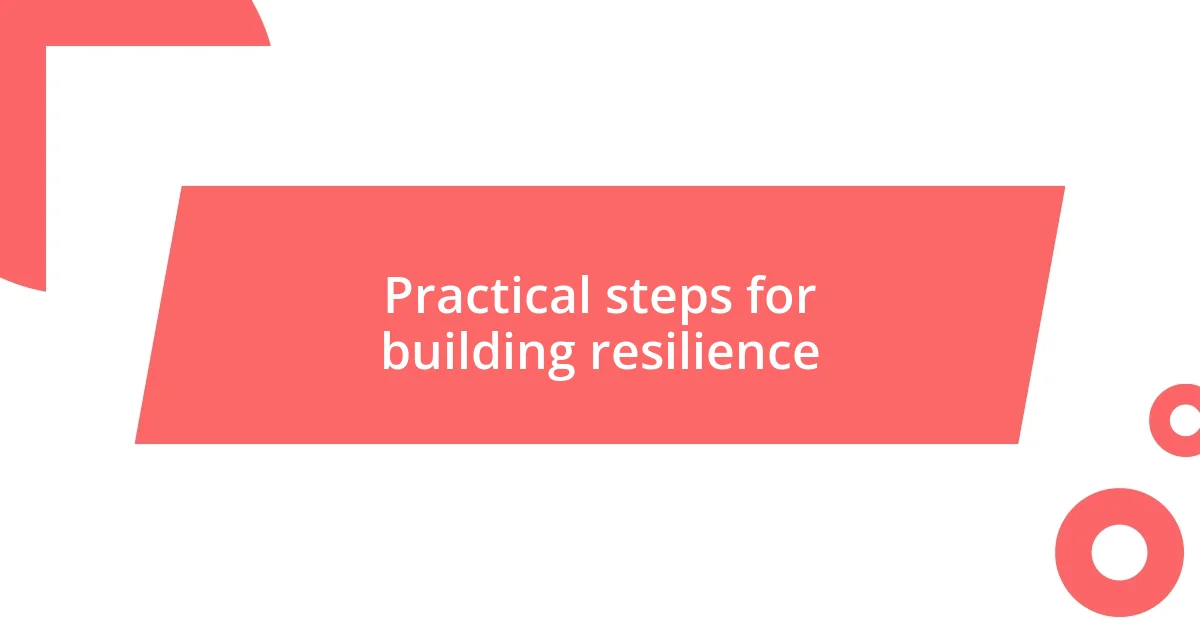
Practical steps for building resilience
Building resilience is all about finding practical steps that resonate with you personally. For me, one key approach has been establishing a consistent routine. On days when uncertainty loomed large, I found solace in sticking to a daily schedule. It provided a sense of normalcy amid chaos, which anchored me when everything else felt unstable. Engaging in regular exercise also became a lifeline; I remember how a simple jog around my neighborhood uplifted my mood and cleared my head. There’s something about moving your body that breaks the cycle of negative thoughts—don’t you find that too?
Here are some practical steps I recommend for building resilience:
- Create a Morning Routine: Start your day with intention. Whether it’s stretching, reading, or enjoying a cup of tea, set a positive tone.
- Set Boundaries: Protect your time and energy by saying no when you need to. It’s okay to prioritize your well-being.
- Cultivate Gratitude: Each evening, jot down a few things you’re grateful for. This practice can shift your focus from worries to appreciation.
- Seek Out Nature: Spend time outdoors. I discovered how a walk in the park could reset my mental space.
- Practice Deep Breathing: Whenever I felt overwhelmed, a few minutes of deep breathing helped ground me and regain control during stressful moments.
Incorporating these strategies into my life was transformative. By consciously taking steps to nurture resilience, I slowly began to notice a shift in my outlook. It’s almost like collecting little tools in a toolbox; each one has its purpose when navigating through a storm. Have you thought about what tools might be in your resilience toolkit?
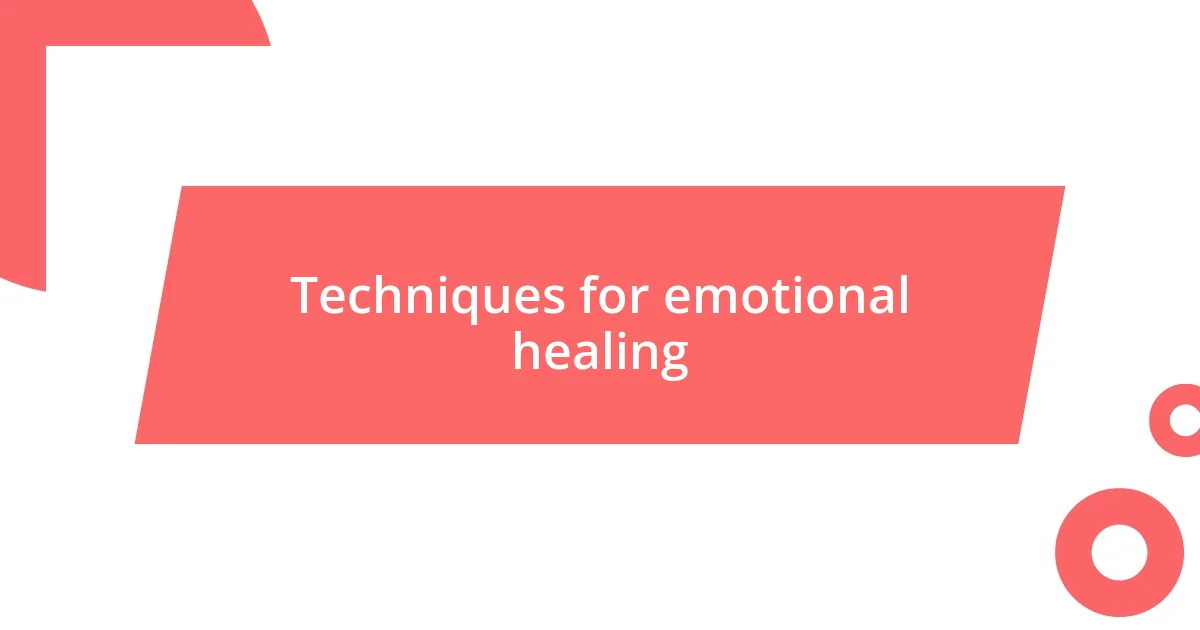
Techniques for emotional healing
I’ve found that practicing mindfulness has been a powerful technique for emotional healing. In moments of stress, I often turn to meditation or simply focus on my breath. I remember a particularly overwhelming day when I sat quietly for just ten minutes, allowing myself to notice my feelings without judgment. That space to breathe and reflect made all the difference—have you ever tried pausing in your day to check in with yourself?
Another approach that has served me well is engaging in creative expression. Whether it’s painting, playing music, or even cooking, tapping into my creativity allows me to process emotions in a non-verbal way. I vividly recall a time when I poured my heart into creating a collage during a challenging phase. It helped me translate my feelings into something tangible, and the satisfaction I felt afterward was immense. What’s your go-to method for expressing emotions creatively?
Lastly, connecting with nature has played a significant role in my emotional recovery. I’ll never forget the peace I felt during a hike in the woods. The fresh air, the sound of leaves rustling, and the beauty of my surroundings lifted my spirits. Nature has this incredible ability to ground us and remind us of life’s cycles. Have you noticed how a simple walk outside can change your perspective? It’s almost like nature holds a mirror to our inner selves, reflecting the tranquility we often need.
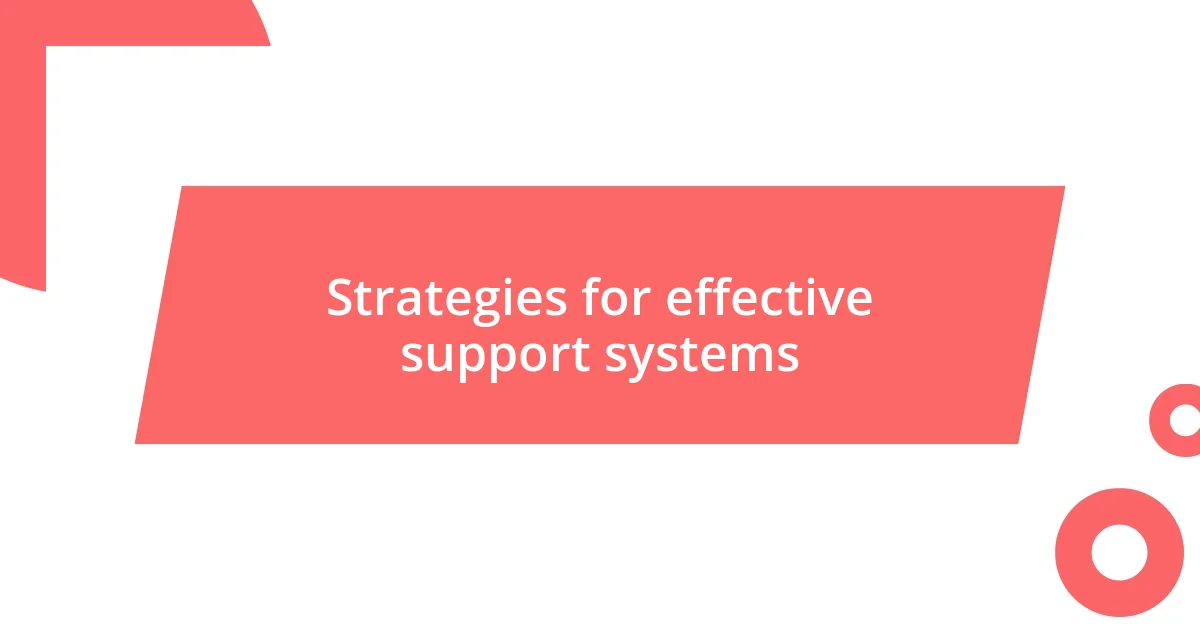
Strategies for effective support systems
Establishing effective support systems during a crisis has been crucial for my recovery journey. I remember reaching out to friends and family during particularly tough times, just to talk and share what I was experiencing. There’s something incredibly empowering about being vulnerable with those you trust, don’t you think? It fosters a sense of connection that reminds you you’re not alone.
Another strategy that worked wonders for me was joining a community support group. It felt refreshing to connect with others who were going through similar struggles. I still recall our weekly meetings where we shared our stories and offered each other encouragement. Those moments of hearing someone else’s journey mirrored my own—it reinforced the idea that we’re all in this together. Have you ever thought about how powerful group support can be in building resilience?
Lastly, I made it a priority to check in regularly with my support network—not just during times of crisis but even when I was feeling alright. These small gestures, like sending a quick text or planning a casual get-together, helped maintain those connections over time. When I take that initiative, it creates a comforting feeling of continuity in my relationships. How often do you reach out to your support system without a specific need? It’s a wonderful way to cultivate mutual support and strengthen those bonds.
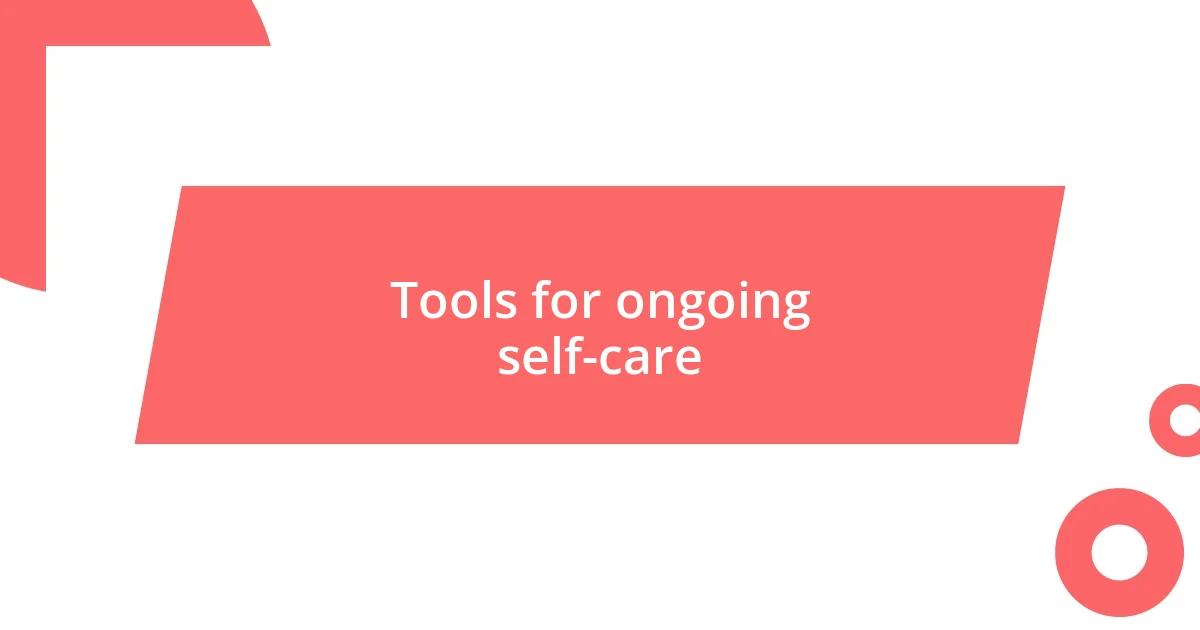
Tools for ongoing self-care
One tool I’ve embraced for ongoing self-care is establishing a daily journaling routine. Writing down my thoughts and feelings each morning has become a sacred space for me. I vividly recall a day when I poured my frustration onto the pages after a tough night’s sleep. The act of writing not only lightened my emotional load but also provided clarity about my feelings. Have you ever noticed how reflecting on your day can shift your mood significantly?
Another method I find valuable is setting boundaries for my digital life. I remember an instance when I realized I was mindlessly scrolling late into the night, which left me feeling drained the next day. So, I designated tech-free hours for myself, particularly in the evenings. This small shift has led to better sleep and a more peaceful mind. How do you ensure your digital habits support your well-being instead of detracting from it?
Lastly, I make it a point to incorporate movement into my daily routine, whether through yoga, dancing, or daily walks. There was a particularly challenging week when I felt overwhelmed, and I chose to dance around my living room. The release of energy and joy that came with those movements was rejuvenating. Are you aware of how even a few minutes of physical activity can elevate your mood? It’s amazing how our bodies and minds are so interconnected when it comes to self-care.
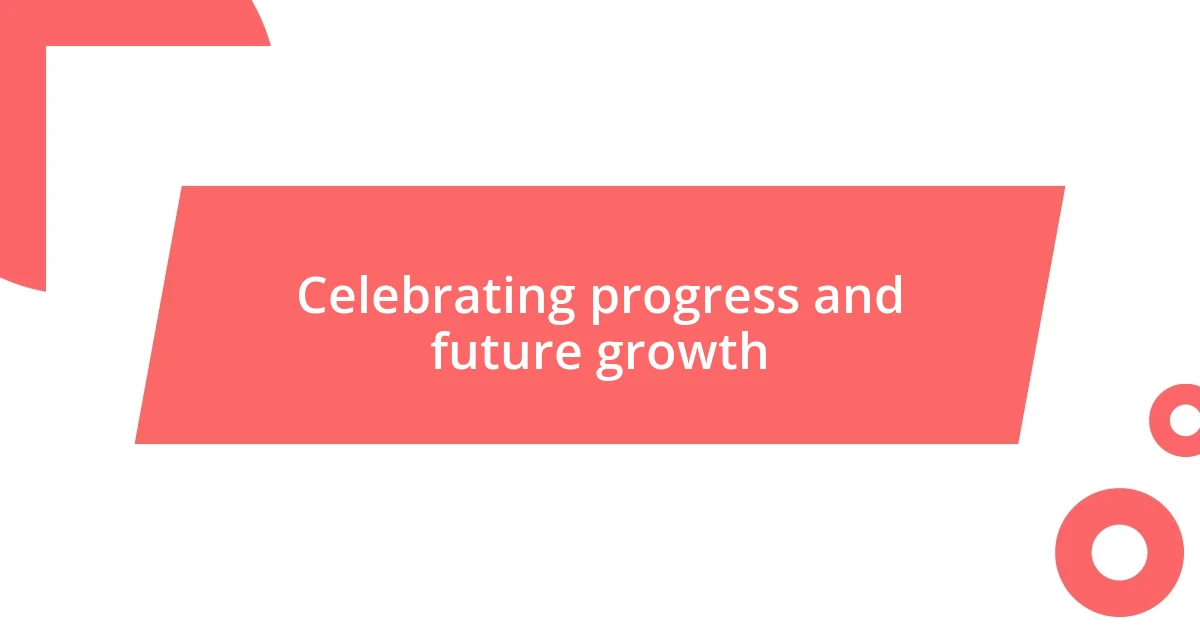
Celebrating progress and future growth
Celebrating progress isn’t just about the big milestones; it’s the little wins that truly matter. I remember the moment I realized that I could recognize my feelings without being overwhelmed by them. It was a revelation that transformed my journey—a step toward recognizing my own resilience. Have you ever paused to reflect on how far you’ve come, even in small ways? Those reflections build a foundation for future growth.
Looking ahead, I’ve learned to embrace a mindset of curiosity and possibility. I vividly recall planning a new project after a challenging period, excited about how it could unfold. That anticipation kept me motivated and focused on what I wanted to create rather than what I had lost. How do you envision your future after overcoming obstacles? Setting intentions helped me pave a clear path forward.
I also found power in gratitude practices, especially when it came to celebrating progress. Each week, I would jot down three things I was grateful for, and what I noticed was profound. It shifted my perspective, allowing me to see not just where I was heading but also how far I had already traveled. Have you tried acknowledging your progress this way? It’s a simple yet transformative process that fuels ongoing growth and resilience.

